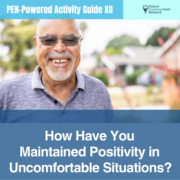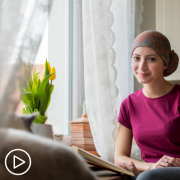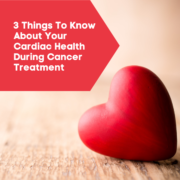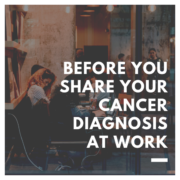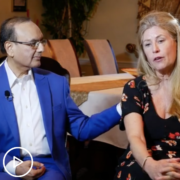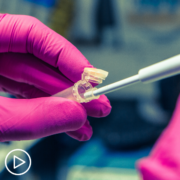How Have You Maintained Positivity in Uncomfortable Situations?
How Have You Maintained Positivity in Uncomfortable Situations? from Patient Empowerment Network on Vimeo.
Despite feeling down or just not feeling well there are time when you have to show up for others whether it be family or friends. Lisa and Thomas, living with Myeloma along with Donna and Diana living with NHL share times when they’ve had to show up for others even when not feeling like their best selves.
See More from PEN-Powered Activity Guide 12
Transcript:
Lisa Hatfield:
Have any of you ever felt the need to be positive even when you might feel like crap, just so others don’t feel awkward, just so other people don’t feel uncomfortable? So, we’ll go around we’ll start from… I’ll start from my left, Donna, Diana and then Thomas if you have any of those… Those instances, what do you do about that, Donna?
Donna:
My situation was, I literally felt like crap, I was sleeping 10, 14 hours a day. My kids came home for Thanksgiving and I’m like, let’s just order from Whole Foods or from Jewel, we’ll get the complete meal, and they were like, No Mom, I really want to cook Thanksgiving will help you, we’ll do everything, and you can just supervise and… So, our meal was set up, we sat down at the table, my children made the stuffing… My son made the mashed potatoes and the stuffing, and my daughter made the gravy, we cooked the turkey, everything was cold… I mean literally cold, but we all sat there with a few friends, and I just wanted to just go in the bedroom and go to sleep. But I put up a good front. I was so happy we did it, they were so proud of themselves to make the meal for me that it brings tears to my eyes now, because they just wanted to have something normal, and for me, it was very difficult, but it was wonderful just to sit there and I kept putting my hand behind my back or maybe sit up straight because I was slumping and I was ready to fall asleep, but I’m telling you that situation for me, I still remember, and we talk about it every Thanksgiving, about what a wonderful meal it was even though it was the coldest Turkey and the coldest mashed potatoes I ever ate. The gravy was already curdling because it was so cold. It was just unbelievable.
So, it’s a great experience. And it meant a lot to all of us really.
Lisa Hatfield:
Well, now, it kind of did turn into a positive because you can talk about it with a smile and kind of laugh about it. Yeah. Sometimes we forge ahead. It turns into that sometimes it doesn’t, but thankfully, the cold mashed potatoes turned into a positive or something to laugh about later. Exactly. Yeah. Diana, do you have any thoughts on that?
Diana:
Honestly, I don’t… I had the opposite situation that Donna did. I felt so bad leading up to my diagnosis, not knowing what was wrong with me, that once I started my treatment, I felt better on chemo. Who does that? I don’t know, but… So, when I took advantage of short-term disability, my immune system was compromised. This was well before covid, so I was in a great place once covid came because I knew exactly what to do and I had enough sanitizer to get through it, but going through treatment, I would always just put on my positive attitude before I left the house, and it just stayed with me and I surrounded myself with positive people, including the people who are treating me.
Lisa Hatfield:
Yeah, good to hear that. Thomas, you ever feel like I have to put on a happy face even when you don’t feel like it?
Thomas:
I do… As I mentioned earlier, maybe off-camera, we are always being watched and being a pillar in the community. I know that when I go to the clinic or when I go out in public, I’ll run into somebody that has seen me on an interview or know I have myeloma or maybe a patient that’s going through the exact same thing, and some of those days I am at my worst, I feel bad, but they will never know because they will always see the same happy go lucky Thomas that they see on video in the clinic or on the posts that I post on my social media. Always smiling. So, it’s something that I deal with all the time, but what I do is I do have an outlet. I have you guys… Because I always feel that I can talk to somebody that has been through some of the same things I’ve been through, they get an understanding of what I’m dealing with, instead of getting the generic… I understand answer. It’s something that happens more than a lot of people like to talk about, but it happens all the time.
Lisa Hatfield:
Would you say sometimes you do go out into the community; I just have to ask… And this is kind of personal. Do you feel like that’s sort of a burden to put on a happy face, or do you just immediately go to your outlet of connecting with others and working out to let it not feel like a burden?
Thomas:
I won’t look at it as a burden because I know that it’s inspiration to them. You know as long as I can inspire somebody else that’s dealing with their disease, or not even a disease, I hear it all the time, I’m in the gym, and people that’s not even diagnosed with cancer or any other disease, they look at me and say, Man, I know what you’ve been through, and I see you in here smiling and laughing and talking and working out, and I’m complaining that I had to get up and come in the gym this morning. So now that I’m in the gym and I see your exercising, you’ve really changed my day, but unbeknownst them that I’m on dexamethasone, I’m wide open… I have scar tissue from some of the areas, scar tissue pain from some of the areas I’ve had radiation. But no one will ever know that.

